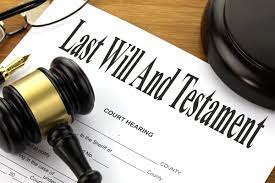An Auckland Lawyer For Challenging an Estate Explainsthe Grounds for Contesting a Will
When a person passes away, their estate which comprises of all their assets must be distributed in accordance with their wishes laid out in the will. The assets include property, shares, vehicles, savings and also any outstanding debts.
If there is no will, then the estate is declared intestate and has to be dealt with through different laws.
Quite often though, a will can be challenged for a variety of reasons. In this situation you will need the help of an Auckland lawyer for challenging an estate. Often a person or persons will feel that they were not fairly treated as a beneficiary. Below we will look at some of the reasons that people consult and Auckland lawyer for challenging an estate.
Various Grounds for Challenging an Estate
Lack of Testamentary Capacity
 A common reason for a challenge is if descendants feel that the deceased person did not have
A common reason for a challenge is if descendants feel that the deceased person did not have
mental capacity to understand the implications of the will. This can be the case if the will was written near the end of their life and may have been affected by various mental health issues. People might claim that the person did not understand the consequences of their decisions.
To challenge an estate in this situation, the lawyer will need to identify the nature of their assets, and the identity of the beneficiaries. To support the challenge, people will need evidence such as medical records and witness testimonies to prove the lack of testamentary capacity.
Undue Influence
Sometimes people might contest that a will was written under pressure or coercion. This is undue influence and occurs when someone exerts excessive influence or pressure on the testator. Again, this can be when the testator is old or of a weak disposition and cause them to make decisions they wouldn’t have made otherwise.
Fraud or Forgery
An estate can be contested if there is a suspicion of fraud. In this case, fraud can be where the testator was tricked into signing the will. If it is suspected that the document is a forgery, this can be falsifying signatures or the will itself to favour someone other than the intended beneficiaries. Authentication of the handwriting or examining how and when the will was signed can be complicated but are necessary to support this type of challenge.
Improper Execution
While movies show surprise discoveries of unknown wills, this is a common situation. However, for a will to be legally binding, it needs to be signed by the deceased person and witnessed by two people who were present at the time of signing. If the will was not executed in this manner, it can be contested.
Revocation
Many times, the deceased will revoke a previous will. This might be intentional such as rewriting the terms of the will and the beneficiaries. Other times it might be that the document was destroyed for some reason. To challenge an estate under this claim will need proof of revocation is necessary to challenge the estate.
Errors in the Will
Occasionally a will may have errors or ambiguities in it. These can lead to challenges or disputes of the estate. Interpretation of the wording becomes the issue. Often a simple error can be agreed and rectified. Other times, especially if the wording is ambiguous, the issue will go to court for a ruling on the intentions of the testator.
Process of Challenging an Estate
Challenging an estate is a difficult issue. It is likely to cause rifts within a family, it will be expensive and will take a long time to resolve. There are legal processes which include filing a claim in the probate court.
Consulting Legal Professionals
 Challenging an estate can be a complex and emotionally charged process. To have a better chance of success it is a good idea to work with an experience lawyer to help you prepare your case and any supporting documentation and evidence.
Challenging an estate can be a complex and emotionally charged process. To have a better chance of success it is a good idea to work with an experience lawyer to help you prepare your case and any supporting documentation and evidence.
One law firm to consider is McVeagh Fleming. They have an Auckland lawyer for challenging an estate.